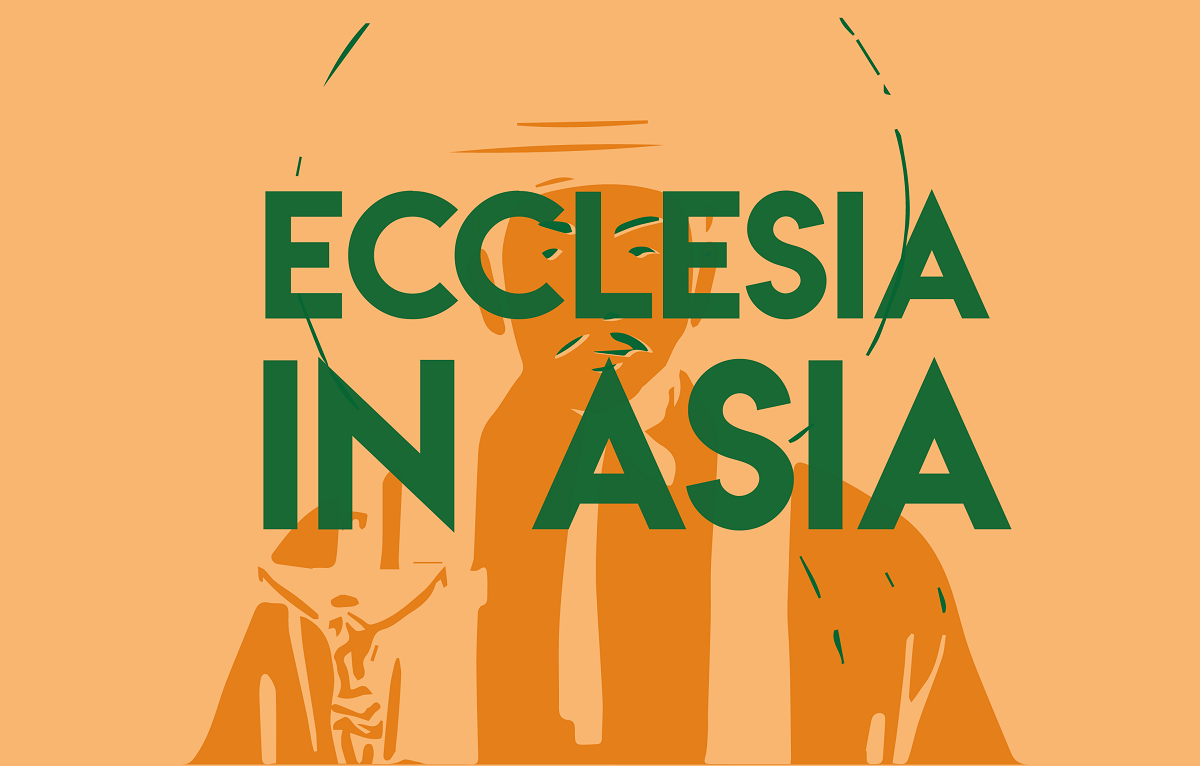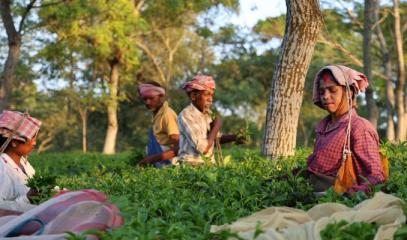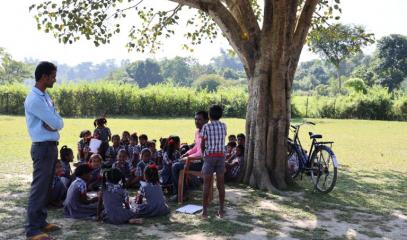Mission among tea farm workers in Kharubanga
In the Indian state of West Bengal, two PIME Fathers and two Sisters of the Immaculate accompany a Christian tribal community that is very poor but proud of its roots.
Bagdogra (AsiaNews) – A single paved road winds through the bright greenery of tea trees. Arriving in the evening, travellers might come across motorcycle headlights and mobile phone flashlights along the way.
Groups of children hiding in the darkness giggle and greet visitors with the Indian Christian greeting Jai Yeshu, folding their hands in front of them.
We are in Kharubanga parish, among the farming villages of Darjeeling, in the Indian state of West Bengal. Travelling along the road ones reaches the site of a church under construction, the brainchild of missionaries with the Pontifical Institute for Foreign Missions (PIME), who have been living here since 2020.
“We needed a larger space," says Father Bala Showri Yaruva, originally from Andhra Pradesh, in the south of the country, who was sent to the Institute's youngest mission in India in July last year, immediately after his ordination.
“In Holy Cross chapel, which stands near our residence, there was not enough room during celebrations; most people were forced to follow the Mass from the courtyard.”
This is a sign of the religious fervour of the community, composed mostly of Adivasis, the indigenous peoples of India who are often relegated to the margins of society. In this case, the distance between tribal people from the rest of India is also physical.
Kharubanga is made up of eight villages (about 400 families for a total of 1,700 people), and is part of the Diocese of Bagdogra, but is far from the big cities and off the main road heading north to Siliguri, the city that serves as a trading post on the border with Nepal, Bhutan, and Tibet. Conversely, basic items are sold in the villages from a few sheet metal shacks.
“Our parishioners are struggling to emerge from the reality of their villages,” explains Father Bala, who, in his parish ministry, supports Fr Xaviour Ambati, who started the mission four years ago after a long experience in Cameroon and is now PIME's regional vice superior for South Asia.
“Most speak only their local language and cannot read or write Hindi," the lingua franca of India’s northern states, “much less English," the missionary notes. “For this reason, even if people earn very little in the village, no one tries to move. And those who do, return to Kharubanga after a few months."
Most Adivasis are employed on tea plantations. The working day starts at 8 am and ends at 5 pm, with an hour lunch break, six days a week.
The leaves, harvested by hand, are put in large bags and then in small trucks at the end of the day. Left to dry in warehouses for four days, they are ready to be bagged and shipped all over the world.
Plantation workers, however, do not share the profits. The daily wage is only 250 rupees, or just under US$ 3, earned only during the dry season, because during the monsoons, from June to August, the fields are all flooded and it is impossible to work.
“For a harvest of more than 15 kilos, a bonus is granted, but the money is still insufficient, barely enough to buy food for a week and send a child to school," says Father Bala.
Children and young people often run around in the streets, and no one checks if they go to school.
Officially the local government school has only nine students because most Adivasi children attend the primary school that Bishop Vincent Aind of Bagdogra has entrusted to PIME together with the parish.
The arrival of Father Ambati has meant a qualitative leap. Six local teachers have been hired (with salary ranging from 5,000 and 7,000 rupees per month, US$ 60 to US$ 85) and families are asked to pay an annual fee of 200 rupees, a figure, however, that many are still unable to cover.
To support the teachers (who have not received specific training), the missionary, who also hails from Andhra Pradesh, called two missionaries of the Immaculate, Sister Nirmala Beck and Sister Carmela Ekka.
Both come from Jharkhand, a state with a large tribal population, culturally similar to Kharubanga parishioners, who are mostly ethnic Kurukh, also known as Oraon.
The Diocese of Bagdogra is also home to ethnic Sadan (Sadri) and Santal, whose languages are closer to Hindi, while the Kurukh language remains incomprehensible to missionaries. For this reason, the help of the two nuns is fundamental.
“We waited a year and a half to come here because we had no place to stay," says Sister Nirmala, the older of the two.
“It’s a difficult mission, because there's nothing. It is challenging, especially because of the low levels of education and because there is also so much to be done for the missionary outreach to young people. But that’s the beauty of challenges. And being in the middle of the green tea plantations is beautiful.”
In the mornings, the missionaries work as teachers in the parish elementary school. The children study on the ground, while oral questions are held outdoors, in the shade of garden trees. In the afternoon, Sr Nirmala and Sr Carmela give repetitions.
“A little girl of just three asked us to give her lessons," explains Sister Carmela, laughing.
Sometimes the two religious sisters help PIME priests, who learnt Hindi in mission, because it is not always taught in school in southern India.
The nuns visit village families together with the clergymen. They travel on a motorcycle along the only road that connects homes and tea plantations to listen to parishioners’ problems.
Many women say they have been left by their husbands and ask for help with paper work. In other homes, the support of missionaries is needed because some people drink too much, often locally brewed rice drink.
“But we see the worst situations when someone gets sick," says Father Bala. Although the companies that run the plantations provide emergency health services, hospitals for Adivasis are both too far away and very expensive; most people prefer not to go there.
“People also turn to us for medicines, because no one can afford them," the priest adds. “During Mass we do not receive monetary offerings, but kilos of rice and potatoes, which we sell at a lower price to poorer families," the 32-year-old missionary notes.
Parishioners go to the clergymen’s home for them to sign baptism and marriage certificates, or get drinking water from the tank, built thanks to PIME funding.
“Other government-built tanks exist around the villages, but they are not been well maintained, and have become unusable."
Despite the lack of resources and the extreme poverty, Kharubanga residents are still happy and proud to be part of the Christian community while maintaining their tribal traditions.
A catechist from the parish (at least one of them lives in each village) wanted the missionaries to hear how their six-year-old daughter had learned the Lord's Prayer in English. An entire village of 60 families converted to Christianity on the same day.
Young people rejoice when men and women religious join them at engagement celebrations. According to tradition, the future spouses, seated opposite each other in the centre of a community gathering, exchange a lit candle and then drink water from each other's cups. Festivities last well into the night.
“We southern Indians are not accustomed to all these group dances and songs,” explains Father Bala. “Celebrations are rigorously punctuated by the mandar, the typical tribal drum with an elongated shape.”
But the most important indigenous festival remains Karam, celebrated every year in late August and early September to favour an abundant harvest.
The name derives from the Kadamba tree (Neolamarckia cadamba), an evergreen used for timber. On this occasion, Adivasis typically wear white dresses embroidered with red and once again dance to the rhythm of the mandars.
"There is still so much to do for the people here," says Father Bala. “The church will be inaugurated in November. But it’s important not to force things; our job is to accompany this community as best we can.”
19/02/2019 19:35
13/10/2022 17:01
03/02/2020 16:40









.png)










